It looks like you're using an Ad Blocker.
Please white-list or disable AboveTopSecret.com in your ad-blocking tool.
Thank you.
Some features of ATS will be disabled while you continue to use an ad-blocker.
share:
...April 19th 1775

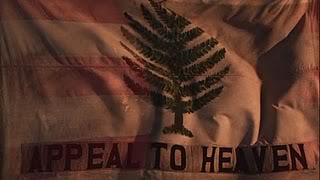
Give me truth my faithful friends and this will make us strong,
Give me hope my loyal Men that we may right the wrong.
Give me faith oh Minute Men, and fear shall disappear,
Give me God beside my arm for victory is near.
Having set out from Boston the night before, On the morning of April 19th, 1775, 900 British regular forces under the command of Lt. Col. Francis Smith were marching on the King's Highway towards Concord, Massachusetts, 17 miles away in the countryside. Their objective was to find and capture weapons and ammunition hidden by the rebel forces in Concord, as General Gage had issued a ban on private ownership of weapons and ammunition earlier in the week. Their other objective was to punish the farmer-rebels of Concord who recently hosted the illegal Provincial Congress in an attempt at self government. The British obtained the location of the hidden arms cache from the Tories of the area who were still loyal to the Crown of King George.
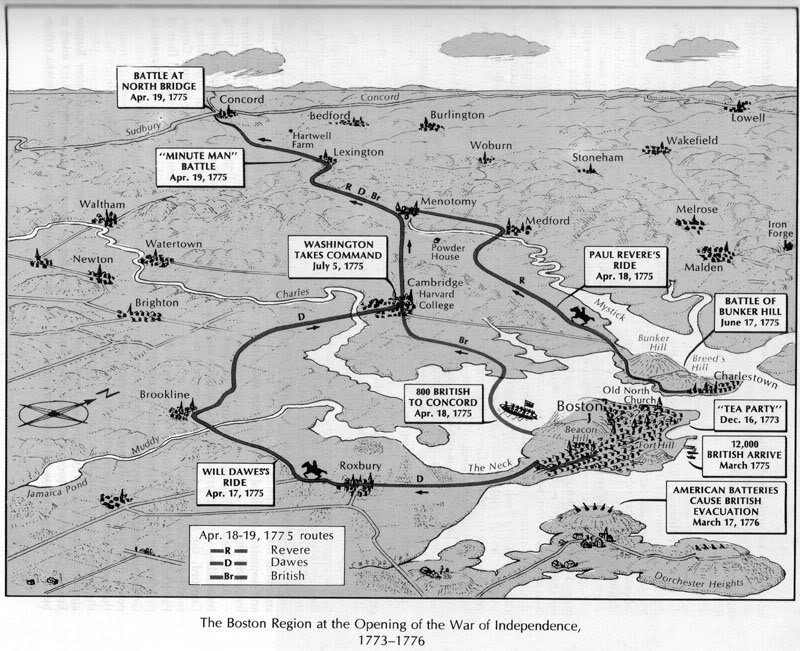
The American alarm system went into action, and riders were sent by several routes to notify all the militia companies throughout the colony that British regulars were marching with the intention to take the arms at Concord. As the British column of red-coated soldiers marched westward they began to hear strange sounds they were not used to hearing in the colonies: bells were ringing in the distance ahead of them, and alarm guns being fired to waken the population.

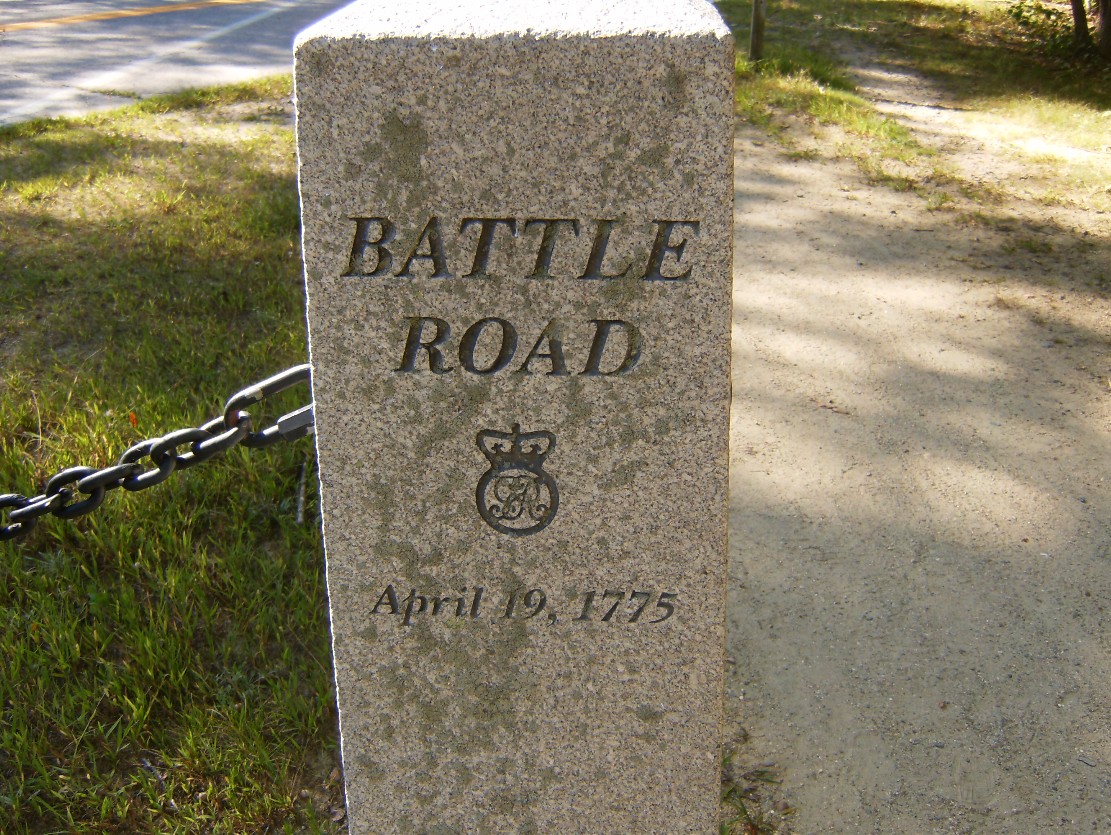

In the village of Lexington, which lay right along the road just before Concord, the residents prepared for a fight they knew was imminent. Captain John Parker’s militiamen gathered at Munroe Tavern to await word about the arrival of the British Army. The presence of John Hancock and Samuel Adams, the two men most wanted by royal authorities, made Lexington a target for the redcoats' attention on their way to Concord.
Shortly after dawn on the 19th of April, 38 militiamen of Lexington confronted the 900 British regulars on Lexington Green.

(Lexington Green)
As the British vanguard formed up in a battle line facing the militia, Colonel Smith, the British commander, was pleasantly surprised by the small size of the American force. He ordered the colonists to throw down their arms and disperse.
Though vastly outnumbered, Captain Parker replied to his men:

(Captain Parker)
BANG! A single shot was fired, followed by dozens more. Whether the shot was fired by a the rebel militia or the British has been lost to history. When the smoke cleared, 18 Americans lay dead or wounded and one British soldier was slightly wounded. The outmatched Minutemen retreated into the nearby woods and the redcoats proceeded westward to their main objective, Concord.


At seven o’clock in the morning the British reached their main objective, the tiny village of Concord. The Redcoats occupied the village center and proceded to march a few hundred yards west to the Concord River, in an effort to seize the Old North Bridge. The British suspected the farm houses on the opposite side of the river to be harboring the arsenal of illegal rebel arms.

(Concord Old North Bridge)

(Looking to the AMERICAN side from the British side)
However, as the British massed their troops upon the bridge, they were not alone. The Redcoats were being watched. About 250 armed farmers gathered on Punkatasset hill above the Old North Bridge, about 300 yards away. These men were lead by their representative, Colonel James Barrett, a Concord farmer and veteran of the French and Indian war. They were unaware of what had just happened at Lexington Green.
As the Minutemen observed the King's men from the hill, something else caught their watchful eye. A pale column of smoke rose over the trees. The British were burning Concord, which lay past the British held side of the river. Joseph Hosmer, Colonel Barrett's second in command turned to Barrett and exclaimed, "Will you let them burn the town down?" Local militia leader, Isaac Davis drew his sword, and, turning to Barret, said: "I haven't a man that's afraid to go."
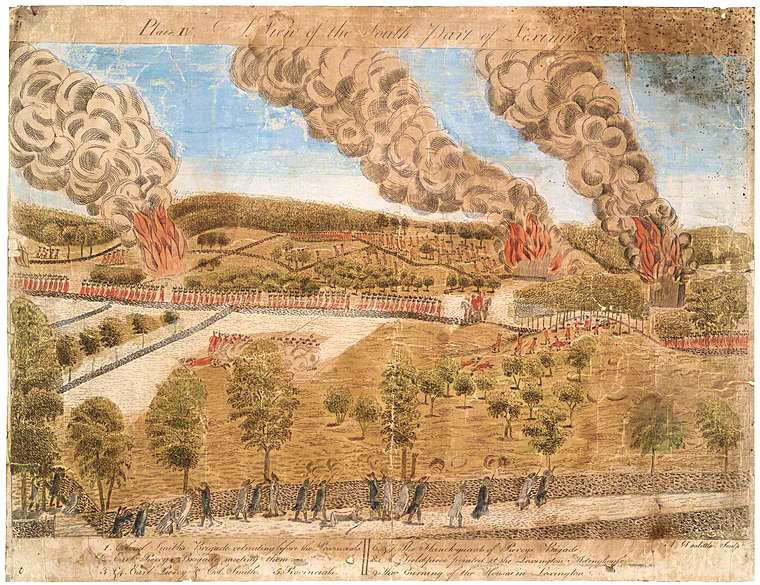

(Punkatasset hill)
Colonel Barrett gave the order to march in defense of Concord. These men resolved to march over the bridge into the middle of the village to defend their homes, or die in the attempt. These farmers, fisherman, woodsman; mostly fathers and their adolescent sons, marched down from the hill toward the bridge.
A child fifer in the lead bravely fluting “The White Cockade”.


Give me truth my faithful friends and this will make us strong,
Give me hope my loyal Men that we may right the wrong.
Give me faith oh Minute Men, and fear shall disappear,
Give me God beside my arm for victory is near.
Having received Intelligence, that a Quantity of Ammunition, Provision, Artillery, Tents and small Arms, have been collected at Concord, for the Avowed Purpose of raising and supporting a Rebellion against His Majesty, you will March with the Corps of Grenadiers and Light Infantry, put under your Command, with utmost expedition and Secrecy to Concord, where you will seize and destroy all Artillery, Ammunition, Provisions, Tents, Small Arms, and all Military Stores whatever - Per Order of General Gage to Lt. Colonel F. Smith, of the Kings Troops
Having set out from Boston the night before, On the morning of April 19th, 1775, 900 British regular forces under the command of Lt. Col. Francis Smith were marching on the King's Highway towards Concord, Massachusetts, 17 miles away in the countryside. Their objective was to find and capture weapons and ammunition hidden by the rebel forces in Concord, as General Gage had issued a ban on private ownership of weapons and ammunition earlier in the week. Their other objective was to punish the farmer-rebels of Concord who recently hosted the illegal Provincial Congress in an attempt at self government. The British obtained the location of the hidden arms cache from the Tories of the area who were still loyal to the Crown of King George.

"The British are coming! The British are coming!"
The American alarm system went into action, and riders were sent by several routes to notify all the militia companies throughout the colony that British regulars were marching with the intention to take the arms at Concord. As the British column of red-coated soldiers marched westward they began to hear strange sounds they were not used to hearing in the colonies: bells were ringing in the distance ahead of them, and alarm guns being fired to waken the population.



In the village of Lexington, which lay right along the road just before Concord, the residents prepared for a fight they knew was imminent. Captain John Parker’s militiamen gathered at Munroe Tavern to await word about the arrival of the British Army. The presence of John Hancock and Samuel Adams, the two men most wanted by royal authorities, made Lexington a target for the redcoats' attention on their way to Concord.
Shortly after dawn on the 19th of April, 38 militiamen of Lexington confronted the 900 British regulars on Lexington Green.
What a glorious morning this is!--Samuel Adams, to John Hancock April 19th 1775

(Lexington Green)
As the British vanguard formed up in a battle line facing the militia, Colonel Smith, the British commander, was pleasantly surprised by the small size of the American force. He ordered the colonists to throw down their arms and disperse.
Throw down your arms, ye villains, ye Rebels, Disperse!
Though vastly outnumbered, Captain Parker replied to his men:
Stand your ground; don't fire unless fired upon, but if they mean to have a war, let it begin here!

(Captain Parker)
BANG! A single shot was fired, followed by dozens more. Whether the shot was fired by a the rebel militia or the British has been lost to history. When the smoke cleared, 18 Americans lay dead or wounded and one British soldier was slightly wounded. The outmatched Minutemen retreated into the nearby woods and the redcoats proceeded westward to their main objective, Concord.
"God wills us free; man wills us slaves: I will as God wills; God's will be done."


At seven o’clock in the morning the British reached their main objective, the tiny village of Concord. The Redcoats occupied the village center and proceded to march a few hundred yards west to the Concord River, in an effort to seize the Old North Bridge. The British suspected the farm houses on the opposite side of the river to be harboring the arsenal of illegal rebel arms.

(Concord Old North Bridge)

(Looking to the AMERICAN side from the British side)
However, as the British massed their troops upon the bridge, they were not alone. The Redcoats were being watched. About 250 armed farmers gathered on Punkatasset hill above the Old North Bridge, about 300 yards away. These men were lead by their representative, Colonel James Barrett, a Concord farmer and veteran of the French and Indian war. They were unaware of what had just happened at Lexington Green.
As the Minutemen observed the King's men from the hill, something else caught their watchful eye. A pale column of smoke rose over the trees. The British were burning Concord, which lay past the British held side of the river. Joseph Hosmer, Colonel Barrett's second in command turned to Barrett and exclaimed, "Will you let them burn the town down?" Local militia leader, Isaac Davis drew his sword, and, turning to Barret, said: "I haven't a man that's afraid to go."


(Punkatasset hill)
Colonel Barrett gave the order to march in defense of Concord. These men resolved to march over the bridge into the middle of the village to defend their homes, or die in the attempt. These farmers, fisherman, woodsman; mostly fathers and their adolescent sons, marched down from the hill toward the bridge.
A child fifer in the lead bravely fluting “The White Cockade”.
edit on 4/19/2017 by METACOMET because: (no reason given)
edit on 4/19/2017 by METACOMET because: (no
reason given)
edit on 4.20.2017 by Kandinsky because: Turned the volume down in the title (caps lock)

(The AMERICAN side of the bridge)
The British were immensely surprised, not only to see a small band of farmers on the hill, but to their shock, they were advancing! The Redcoats withdrew to the village side of the bridge and massed around the narrow span. They had to hold the bridge. Colonel Smith had his orders from General Gage, and he meant to carry them out. With their hundreds of glistening guns pointed toward the river, the British soldiers took aim. The rebels kept coming. A shot rang out. A shot heard 'round the world. A rag-tag band of farmers confronted the King's soldiers... and beat them.


The Americans seemed to drop from the clouds and we were totally surrounded with such an incessant fire as it is impossible to conceive. -British officer

William Emerson, the village reverend "who had turned out amongst the first in the morning to animate and encourage his people by his counsel and patriotic example," and who urged his flock that morning; "Let us stand our ground. If we die, let us die here.” wrote this account.
For half and hour, the enemy, by their continuous marches, discovered great fickleness and inconstancy of mind; till at length they quitted the town, and retreated by the way they came. In the meantime a party of our men took the back way, through the Great Fields, into the east quarter, and had placed themselves to advantage, lying in ambush behind walls, fences and buildings, ready to fire upon the enemy on their retreat.

(The Great Fields)

As the British retreated to the safety of Boston, they were astonished to find 6,000 Minutemen from local villages had descended upon the outskirts of Concord. The Minutemen waited for the British until they reached Merriams Corner, where they sprung upon them. The Minutemen hid behind trees and stone fences to attack the British from both sides of the "King's" road. They were harried every step of the way. The British mission was a failure. The rebel leaders were safe and the colonists had salvaged their cache of arms.

(Meriams Corner)

"The Sword is now drawn, and God knows when it will be sheathed."
Thus, the “embattled farmers” had won the day. The Revolution was on; there was no turning back. The British crossed the Charles River to what they thought was the safety of Tory occupied Boston. However, they were wrong. Tens of thousands of American militiamen surrounded Boston and began what is now known as the "Siege of Boston" and the battle of Breeds "Bunker" Hill. Eventually the British had no choice but to retreat from Boston once and for all, by way of ship. Soon after Boston was liberated by the revolutionary forces, Washington began his Continental Army campaigns to the south, eventually winning the war outright in the years to come.
That blood stain, on the vernal sword, Hallowed to freedom all the shore; In fragments fell the yoke abhorred--- The footsteps of a foreign lord Profaned the soil no more.
By rude bridge that arched the flood, Their flag to April's breeze unfurled, Here once the embattled farmers stood And fired the shot heard round the world.
Never forget.
...April 19th 2017
edit on 4/19/2017 by METACOMET because: (no reason given)
Thinking about the men that built this country is both incredibly inspiring and unbelievably depressing at the same time.
These weren't militay men, they were citizens. There are very few alive today we could even measure up to the bravery of one of the adolescent boys who fought alongside his father.
These weren't militay men, they were citizens. There are very few alive today we could even measure up to the bravery of one of the adolescent boys who fought alongside his father.
edit on 19-4-2017 by MisterSpock because: (no reason given)
edit on 19-4-2017 by MisterSpock because: (no reason
given)
edit on 19-4-2017 by MisterSpock because: On a phone, lots of missed autocorrect
edit on 19-4-2017 by
MisterSpock because: (no reason given)
*APPLAUSE*
If I could give it.
Best thread I've read in years.
I couldn't thank you enough.
Stand tall, stand proud...ye fellow countrymen.
If I could give it.
Best thread I've read in years.
I couldn't thank you enough.
Stand tall, stand proud...ye fellow countrymen.
All men recognize the right of revolution; that is, the right to refuse allegiance to, and to resist, the government when its tyranny or its inefficiency are great and unendurable. I think that it is not too soon for honest men to rebel and revolutionize. How should a man behave toward this American government today? I answer, that he cannot without disgrace be associated with it. I quarrel not with far-off foes, but with those who, near at home, co-operate with, and do the bidding of those far away, and without whom the latter would be harmless.
If a thousand honest men were not to pay their tax this year, that would not be a violent and bloody measure, as it would be to pay them, and enable the state to commit violence and shed innocent blood. This is, in fact, the only definition of a peaceable revolution, if any such is possible. But even suppose blood should flow. Is there not a sort of blood shed when the conscience is wounded? Through this wound a man's real manhood and immortality flow out, and he bleeds to an everlasting death. I see this blood flowing now.
When I converse with the freest of my neighbors, I perceive that, whatever they may say about the magnitude and seriousness of the question, and their regard for the public tranquillity, the long and the short of the matter is, that they cannot spare the protection of the existing government, and they dread the consequences to their property and families of disobedience to it. I, on the other hand, can afford to refuse allegiance to the government, and its right to my property and life. It costs me less in every sense to incur the penalty of disobedience than it would to obey.
When I meet a government which says to me, "Your money or your life, " why should I be in haste to give it my money? The state is not armed with superior wit or honesty, but with superior physical strength. I was not born to be forced. I will breathe after my own fashion. Let us see who is the strongest. But we love better to talk about it: that we say is our mission. Thus men will lie on their backs, talking about the fall of man, and never make an effort to get up.
As for adopting the ways of the State has provided for remedying the evil, I know not of such ways. They take too much time, and a man's life will be gone. Statesmen and legislators, standing so completely within the institution, never distinctly and nakedly behold it. They speak of moving society, but have no resting-place without it. Is this form, such as we know it, the last improvement possible in government? Is it not possible to take a step further towards recognizing and organizing the rights of man? Are we meant to acquire a little worldly wealth, or fame, or liberty, and make a false show with it, as if we were all husk and shell, with no tender and living kernel to us? If a plant cannot live according to nature, it dies; and so a man.
The authority of government, even such as I am willing to submit to—must have the sanction and consent of the governed. It can have no pure right over my person and property but what I concede to it. There will never be a really free and enlightened State until the State comes to recognize the individual as a higher and independent power, from which all its own power and authority are derived, and treats him accordingly. A State which bore this kind of fruit, and suffered it to drop off as fast as it ripened, would prepare the way for a still more perfect and glorious State, which I have also imagined, but not yet anywhere seen. I heartily accept the motto,—"That government is best which governs least"; and I should like to see it acted up to more rapidly and systematically. Carried out, it finally amounts to this, which also I believe—"That government is best which governs not at all"; and when men are prepared for it, that will be the kind of government which they will have.
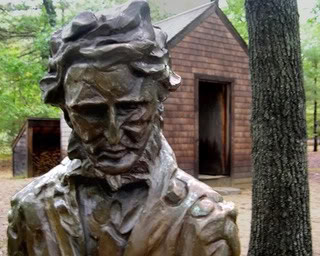
-Henry David Thoreau, Concord, Massachusetts, 1849
a reply to: METACOMET
That was well done.
Really makes you wanna go fight for something important even if it means dying for something important.
Our problem however isn't the motivation so much as knowing which is the right direction. I think there are lots of people who would fight for a better nation, but everything is so confusing and messy now that it's almost impossible to figure out who the real enemy even is anymore so we just kill each other instead.
But there is always hope....
That was well done.
Really makes you wanna go fight for something important even if it means dying for something important.
Our problem however isn't the motivation so much as knowing which is the right direction. I think there are lots of people who would fight for a better nation, but everything is so confusing and messy now that it's almost impossible to figure out who the real enemy even is anymore so we just kill each other instead.
But there is always hope....
S & F! Sometimes a flag is not enough. Thank you for an excellent post!
And some people wonder why Americans cling to their guns ! A rag tag bunch of farmers beat a professional army and went on to claim a nation.. I do
believe people were smarter back then ... at least their writings were words of inspiration and meaning.
Star & several flags
Star & several flags
a reply to: 727Sky
Not quite.
The Colonists had help from The French, Dutch and Spanish.
Without The French Navy blockading the ports the outcome may have been quite different, who knows.
Also thousands of British Troops where at war in India which could have been used in The American Colonies
! A rag tag bunch of farmers beat a professional army
Not quite.
The Colonists had help from The French, Dutch and Spanish.
Without The French Navy blockading the ports the outcome may have been quite different, who knows.
Also thousands of British Troops where at war in India which could have been used in The American Colonies
originally posted by: alldaylong
a reply to: 727Sky
! A rag tag bunch of farmers beat a professional army
Not quite.
The Colonists had help from The French, Dutch and Spanish.
Without The French Navy blockading the ports the outcome may have been quite different, who knows.
Also thousands of British Troops where at war in India which could have been used in The American Colonies
Not in the initial battle however you are quite correct about the later history of the whole thing... Wonder who would come helping in today's world ?
Lol, just one person take one long arm and march anywhere in daylight around the town now... lol.
It was the resolve that led the French to our aide. Without resolve no one would have thought we had a chance. Plus, it appears God himself favored
Gen Washington on many occasions in the battle field. Luck you say? Well luck usually is preparation meets opportunity.
a reply to: METACOMET
Great post star and Flag for sure!! We need this solid nationalist spirit today because we have enemies within now that threaten our very liberties. They call themselves progressives but in reality they are communists. They use media to brainwash the populace into believing they are some how responsible for the terrible wrongs of history. The modus operandi is political correctness and public opinion trials via the internet and mainstream media. Make no mistake the clouds of conflict are brewing and when the duped populace wakes up the perfect storm will surely befall us all.
No government is perfect but these men of history gave us the closest form to it. Hold it dear and defend it with all your heart.
Great post star and Flag for sure!! We need this solid nationalist spirit today because we have enemies within now that threaten our very liberties. They call themselves progressives but in reality they are communists. They use media to brainwash the populace into believing they are some how responsible for the terrible wrongs of history. The modus operandi is political correctness and public opinion trials via the internet and mainstream media. Make no mistake the clouds of conflict are brewing and when the duped populace wakes up the perfect storm will surely befall us all.
No government is perfect but these men of history gave us the closest form to it. Hold it dear and defend it with all your heart.
new topics
-
I sleep no more.
Philosophy and Metaphysics: 2 hours ago -
Canada caught red-handed manipulating live weather data and make it warmer
Fragile Earth: 2 hours ago -
Why Files Our Alien Overlords | How We Secretly Serve The Tall Whites
Aliens and UFOs: 3 hours ago -
Curse of King Tuts Tomb Solved
Ancient & Lost Civilizations: 5 hours ago -
What allies does Trump have in the world?
ATS Skunk Works: 5 hours ago
top topics
-
BIDEN Admin Begins Planning For January 2025 Transition to a New President - Today is 4.26.2024.
2024 Elections: 13 hours ago, 10 flags -
Big Storms
Fragile Earth: 15 hours ago, 9 flags -
Canada caught red-handed manipulating live weather data and make it warmer
Fragile Earth: 2 hours ago, 9 flags -
Why Files Our Alien Overlords | How We Secretly Serve The Tall Whites
Aliens and UFOs: 3 hours ago, 7 flags -
Curse of King Tuts Tomb Solved
Ancient & Lost Civilizations: 5 hours ago, 6 flags -
What allies does Trump have in the world?
ATS Skunk Works: 5 hours ago, 3 flags -
I sleep no more.
Philosophy and Metaphysics: 2 hours ago, 1 flags
active topics
-
Krystalnacht on today's most elite Universities?
Social Issues and Civil Unrest • 19 • : TheWoker -
Hate makes for strange bedfellows
US Political Madness • 56 • : YourFaceAgain -
Do you ever just get "bored" of everything?
Rant • 23 • : FlyersFan -
I sleep no more.
Philosophy and Metaphysics • 3 • : nerbot -
Mood Music Part VI
Music • 3119 • : TheWoker -
Gov Kristi Noem Shot and Killed "Less Than Worthless Dog" and a 'Smelly Goat
2024 Elections • 80 • : FlyersFan -
"We're All Hamas" Heard at Columbia University Protests
Social Issues and Civil Unrest • 301 • : TheWoker -
New whistleblower Jason Sands speaks on Twitter Spaces last night.
Aliens and UFOs • 76 • : Jukiodone -
Canada caught red-handed manipulating live weather data and make it warmer
Fragile Earth • 9 • : CosmicFocus -
University of Texas Instantly Shuts Down Anti Israel Protests
Education and Media • 338 • : Xtrozero
